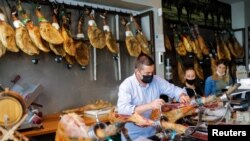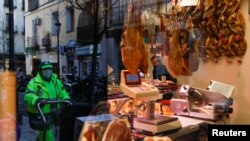As Spanish Catholics prepare to give up meat on Fridays as part of the holy season of Lent, a government minister sparked a political row after suggesting eating less meat would be a good idea.
Spain is Europe’s biggest exporter of ham and jamón as it is known in Spanish, is a national gastronomic icon, along with paella or Rioja wine.
So, when Spain's consumer affairs minister, Alberto Garzón, recently suggested eating less meat would help combat climate change and that said industrial farms could cause pollution, it prompted a fiery national debate about farming methods.
He voiced support for traditional livestock farming methods in which cattle or pigs are allowed to graze.
“That is sustainable; what isn’t sustainable is these so-called mega farms,” Garzón said in an interview with The Guardian, a British newspaper.
“They find a village in a depopulated bit of Spain and put in 4,000 or 5,000 or 10,000 head of cattle. They pollute the soil; they pollute the water and then they export this poor-quality meat from these ill-treated animals.”
The main opposition conservative People’s Party seized on the dispute to try to win over disaffected voters in rural areas.
Pablo Casado, leader of the People’s Party, said in a speech earlier in February that voters needed “more farming and less communism” - a reference to Garzón's membership of the far-left United Left party which was linked to the Communist Party.
The dispute created a breech in Spain’s coalition government between the moderate the center-left Socialists and their junior partners, the far-left Unidas Podemos.
Spain’s government said last week that mega farms, which contain more than 10,000 animals, made up only 0.016% of all farms in the country.
Anger
As the debate heated up, angry farmers who were new seeking licenses to open new farms in Lorca, in Murcia, southeastern Spain, stormed the local council last month. Seven were charged with public order offenses and will stand trial later this year.
In Lorca there are 2,040 farms, of which 663 are pork farms, the city council said.
Another town in the Murcia region is Jumilla where 16 pig farms house 240,000 animals, according to the environmental group Save Our Land, or SOL.
The group’s Cati Rodriguez claimed that waste from the animals passes into the local water supply and contaminates the drinking water supply.
“We get our water supply from aquifers but there are such high levels of animal waste that it passes into the water supply. Tests carried out with Greenpeace last year found the level of nitrates was 50% per liter which is above the safe level for human consumption,” she told VOA.
She said the problem was not limited to Jumilla but existed across Spain.
VOA contacted Cefusa, which is responsible for the farms in Jumilla. A spokesperson, who asked not to be named in accordance with company policy, said Cefusa strictly complies with current environmental legislation. “We have adapted our facilities and our production model to the requirements established in the different environmental prevention regulations applicable at the regional, national and European levels in recent years,” the spokesperson said.
In the neighboring region of Castilla la Mancha, home to Miguel de Cervantes’ famously errant knight Don Quixote, there are 1.7 million pigs, according to Spanish government figures.
Emiliano Garcia-Page, the Socialist regional president, has insisted that despite criticism from environmentalists, conditions in large industrial farms comply with European Union health and safety regulations.
As if to prove his point, he invited Garzón to visit a farm.
“When you know how (these farms) work from the inside and how the agri-food industry works, you will see Spain has extraordinary levels of quality and guarantees. Otherwise, you are going to spend your life without being able to order a sausage or a steak,” he said.
Jamón not only holds a symbolic position in society but in economic terms, it is the country's second most important agricultural export after fruit and vegetables.
In 2020, meat brought $6.09 billion in revenue compared with $7.88 billion from fruit and vegetables.
Germany had long been the largest producer of pork in the European Union but an outbreak of African Swine Fever in 2020 meant Spain took over as the largest exporter to the lucrative Chinese market.
There are several types of Spanish ham which is produced in different ways.
At the top end of the market is jamón iberico de bellota, which is made from black pigs. They are allowed to graze for years in meadows and are fed on acorns and herbs.
Jamón iberico de cebo is made from animals who are fed on animal fodder and cereals. Both are regarded as delicacies as well as jamón serrano.
Processed ham is generally produced in industrial-scale farms in which hundreds, or thousands of animals are kept.
Changing attitudes
Attitudes towards the way animals are treated are changing in Spain.
A survey published in January by the BBVA Foundation, associated with Spain's second largest bank, found most Spaniards polled reject their use in circuses, bullfights and for use to research cosmetics.
Eight out of ten people said they considered animals should be respected, in the survey of 2,000 people.
Animal rights organizations have carried out a series of high-profile undercover investigations to expose alleged abuse of animals on farms.
The directors of Los Hermanos Carrasco, the company which controls a pig farm in Totana, in Murcia, are to stand trial accused of alleged animal cruelty and offenses against public health after an investigation by Igualdad Animal. They deny the allegations.





